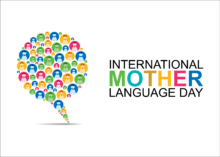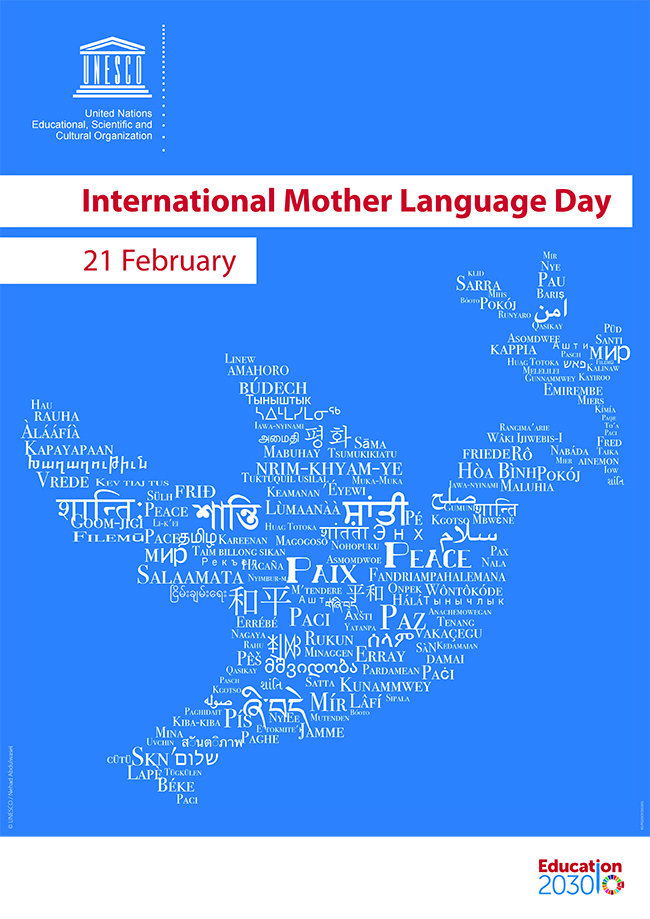MULTILINGUALISM - The New Global Competence Standard: Mother Language + 2
21 February 2022, 11:00 am – 12:45 pm
In elaborating on the Sustainable Development Goals in 2015, the United Nations asserted the importance of global citizenship education, a process enhanced by the acquisition of languages other than one’s own. That acquisition also serves a key element in CTAUN’s mission “to incorporate global awareness into curricula and school activities at all levels.”

Presenters included:
MARK WOODWORTH HARRIS President Emeritus, Berlitz & ELS Language Services; Creator and Co-Founder – Many Languages, One World (MLOW).
ALEKSEY TSYKAREV Chairperson, Center for Support of Indigenous Peoples and Civic Diplomacy “Young Karelia” (NGO) under consultative status with UNESCO; Expert and Vice Chair, UN Permanent Forum on Indigenous Issues; Member of Task Force, UN International Decade of Indigenous Languages 2022-2031
ARBRE AGULLO GUERRA Expert in Catalan
Dr. KATHLEEN STEIN-SMITH Professor of French and a leading advocate for the study of foreign languages in the USA
and three “Many Languages One World” alumni:
ELISA CAPOBIANCO “Many Languages, One World” alumna from Italy — LANGUAGES: Italian, French, English
SARA JEFFAR “Many Languages, One World” alumna from Morocco — LANGUAGES: Arabic, French, English, Italian
GUGULETHU JEMAINE “Many Languages, One World” alumna from Zimbabwe — LANGUAGES: Shona and Ndebele (mother languages), English (medium of instruction), Mandarin Chinese, Russian
RAMU DAMODARAN conducted the Q&A session.
A recording of the webinar can be viewed HERE.
Webinar Summary:
Anne-Marie Carlson, leader of the Committee on Teaching About the United Nations (CTAUN), welcomed the 311 registrants from 52 countries on this International Mother Language Day, the object of which is to preserve different cultures and languages to foster tolerance and peace. She greeted everyone in Norwegian, which is the language of her family, and in Bahasa Indonesia, the national language of Indonesia where she lived and taught for close to 3 years. She introduced Mark Harris as the inspiration for today’s webinar.
Mark W. Harris, a member of CTAUN’s Advisory Council and the co-founder of “Many Languages, One World,” spoke of language as the DNA of culture, since it dictates and defines how we experience our lives and how we understand the world around us. He added we should be grateful for our mother language and respect those of others.
He offered many statistics on national and international education policies that encourage multilingualism or can, unfortunately, suppress native languages. He acknowledged the value of the use of the internet in the learning of language and believes that today one needs their mother language plus two others because of our global connectiveness.
Aleksei Tsykarev has been a lifetime activist for the rights of indigenous peoples in Russia. Presently he serves as the Vice Chair of the UN Task Force for the International Decade of Indigenous Languages (2022-2032).
He welcomed everyone in his own language, Karelian, which is one of the many indigenous languages of Russia. He talked about the connection between language and culture. He shared the proposed work of the United Nations Task Force during the “Decade.” which will be to draw attention to the critical loss of indigenous languages and the urgent need to preserve, revitalize, and promote these languages by taking steps at the national and international levels.
He told of the work that the United Nations is doing now – giving technical advice, facilitating dialogue, developing studies that focus on education, encouraging decision making, and highlighting the role of indigenous language and culture.
He ended by inviting all to the upcoming ceremonies for the International Decade of Indigenous Languages.
Arbre Agullo Guerra, a speaker of the language, Catala, had been interviewed by Mark Harris. Citing the suppression of this native language as an example of politics, Mark showed in slides how although it was widely used in culture and commerce until the year 1700, a decree of Louis XIV completely outlawed its use. 375 years of repression followed, but Catala was secretly spoken in the villages and countryside. In 1975 Catalonia became an autonomous state, and teachers could teach Catala, but not many knew it. For this reason and the fact that young people use English, Catala may not flourish.
Kathleen Stein-Smith, author and college professor, began by acknowledging that Mark Harris and “Many Languages, One World” had a “profound impact” on her professional life. She then pointed out that the United States has a foreign language deficit – only 1 in 5 students have the opportunity to study language; she called for advocacy efforts to influence government policy, mentioned organizations that promote language learning, and presented two “must read” books. Speaking of the importance of multilingualism, she noted that it is essential to the work of the United Nations, is important to the present and future of young people, and is a key to fostering harmony.
Mark Harris introduced the next segment by giving a history of “Many Languages, One World.” It was created as an annual event that would involve university students around the world in an essay contest that would challenge them and exhibit the relevance and importance of multilingualism and global citizenship. Students had to present an essay on a topic of international importance written in an acquired language – not their own or one they had been schooled in. The three young women who spoke are winners of this contest.
Sara Jeffar has a PhD in Literature and is studying for a Master in Poli Sci at the University of Milan. Her language journey – which she describes as joyful and rich – began with her mother language of Arabic and continued wiith French, English, Japanese, German, Italian and Turkish. She believes that learning language can build identity, heal trauma, nurture emotional intelligence, help to understand the “other,” understand one’s self, support scientific research, facilitate peace and build respect.
Gugulethu Jemaine is from Zimbabwe and learned Chinese, English and Russian in addition to the tribal languages of Shona and Ndebele. She believes that if one puts in time, interest and effort, that one can learn a language and also learn about its environment and culture. She feels that language study has expanded her mind; it also gives people access to job opportunities and communities, the ability to hold effective cultural dialogue, and to gain true respect for other cultures.
Elisa Capobianco has a MA in Performing Arts from the University of Rome; she works in TV production for ASvIS, a network that fosters the 2030 Agenda. Elisa speaks English, French and Italian. Her study of language plunged her into a new environment and changed her way of looking at life and the world. She realized she has a responsibility as both a citizen of Italy – a European – and as a citizen of the world- to plan for the peace, the planet and prosperity.
Ramu Damodaran moderated the Question and Answer segment – here are a few samples:
He asked Aleksei about the role of creativity as a vehicle for communicating the richness of language. Aleksei replied that indigenous language speakers contribute to the local economy through their craftsmanship.
He asked Kathleen Stein-Smith about the role of technology in the learning of language. She answered that on- line learning can help to solve accessibility and availability problems for both new learners and those who wish to improve their English skills.
He asked Sara Jeffar how music has enriched her study of language. She replied that she began to study Japanese because the words of a song intrigued her. She started to learn English in the same manner.
He asked Gugelethu how she feels when a stranger speaks her language. She said that she feels grateful because it means the person acknowledges her as a person and shows interest in her culture.
He asked Elisa how language has helped her identify herself. She said that it helped her realize that she had a responsibility not only to her region of Europe but to the world. For the full Q&A you can view the video.
Mark Harris gave closing remarks.
Anne-Marie Carlson announced the next CTAUN webinar will be on Friday, April 22, 2022 which is Earth Day. The topic will be global heating and how we can mend a fractured planet.
She also recommended Virtual Tours of the United Nations, which can be arranged at un.org/visit
February 21 has been designated by the UN as INTERNATIONAL MOTHER LANGUAGE DAY

UNESCO
